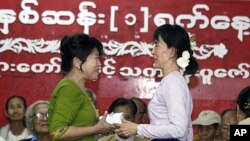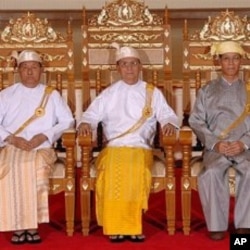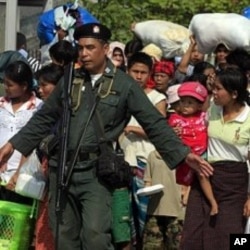The European Union has announced it is suspending some sanctions against Burma, now that a nominally civilian government has replaced the military one. The move follows calls for western governments to remove the economic and political punishments, altogether, and reports that top military leader Than Shwe has retired. But Burma's main opposition, led by democracy leader Aung San Suu Kyi, says sanctions should remain until human rights improve. Analysts say a combination of targeted sanctions and diplomacy may be the best way to engage Burma.
Reversal of measures
The European Union's suspension of sanctions against Burma, although temporary, is the first reversal of punitive measures put in place by western governments for the military's abuses.
The EU has issued a one-year suspension of its visa and asset freeze for civilian leaders and the foreign minister. A ban on high-level EU visits to Burma has also been lifted.
The relaxing of sanctions follows the replacement of the military government, last month, by Burma’s first civilian government in decades, although it remains dominated by former military officers.
Need for suspension
David Lipman, EU ambassador to Burma, Cambodia, Laos and Thailand, says the suspension of sanctions is needed to pave the way for possible ministerial-level talks with the new government and key opposition figures in Burma, also known as Myanmar.
"We want to engage," he said. "We want to engage at a high level with the government and with all other democratic stakeholders in Myanmar. And, that is why we’re suspending [sanctions]. It is our intention to have, to develop a high-level dialogue with, as I say, the new institutions and with opposition figures, across the spectrum."
Lipman says Burma’s former and current military leaders, including President Thein Sein, are still subject to the visa ban and asset freeze.
The November election was condemned, internationally, as a sham designed to mask the military's continued rule. Allegations of cheating and intimidation were widespread.
Even before votes were counted, the military-drafted constitution guaranteed the military a quarter of all seats in parliament. And, the leader of Burma's main opposition National League for Democracy, Aung San Suu Kyi, was banned from running for office.
Government change and military
The NLD boycotted the polls. It won Burma's previous election, in 1990, but the military refused to give up power and put Aung San Suu Kyi under house arrest for most of the past two decades. She was released just days after the latest election.
After the new government was sworn in, Burma’s senior general, Than Shwe, is reported to have given up his position and stepped down from power. But analysts say the military is still in control.
Carl Thayer, a professor of Southeast Asia politics at Australia's University of New South Wales, says Than Shwe is still pulling strings, behind the curtain.
"I see him playing a role like his predecessor, Ne Win," said Thayer. "That is, for the next several years, his role will be that of 'king maker' behind the scenes. It's clear, although he shed his senior general title, that he's continuing to meet with top military and civilian officials and has influenced promotions up until quite recently. So, he still has power, for the moment, but his age is a factor ticking against him."
Political prisoners
Burma still has more than 2,000 political prisoners and rights groups say military abuses include forced labor, torture, rape and extrajudicial killings.
In February, the NLD called for dialogue on the sanctions issue, but said it wants them to stay in place until human rights improve.
The United States appointed a Burma envoy, last week, to increase dialogue with the new government, but says it is premature to lift sanctions.
Supporters of sanctions say economic and political punishments are the only way to pressure Burma's military to allow democracy.
Maung Zarni, a Burma researcher at the London School of Economics, says some countries are focusing on strategic and commercial interests, while brushing over why sanctions are there in the first place.
"Sanctions have been put in place for good reason, in terms of the regime's human rights behavior," said Maung Zarni. "And, that behavior has not changed at all."
History of Burma sanctions
Western governments first imposed sanctions against Burma after a bloody crackdown in 1988 against pro-democracy demonstrators.
Australia and the United States blocked weapon sales and visas for Burma’s leaders and the U.S. froze some of their assets.
Further sanctions followed widespread arrests of activists and the government's refusal to acknowledge results of the 1990 election.
In 2003, the United States banned all trade with Burma.
Another military crackdown against democracy protesters in 2007 led to more and tighter sanctions.
Canada and the EU stopped all trade, except humanitarian goods.
Despite its history of abuse, Burma’s neighbors in Southeast Asia have long argued for engagement and that economic sanctions are more harmful to ordinary people than the military.
Some think tanks, like the International Crisis Group, have for years been echoing those sentiments.
Jim Della-Giacoma, the Southeast Asia project director for the ICG, says the sanctions are too broad brush and restrict international aid and development organizations in Burma. He says, if blocks on trade, finance, and investment are removed, it would have a positive effect on Burma.
"Positive in both giving the citizens of Myanmar access to these programs and these developments and these benefits, but also I think it would lead to a change in the political tone that would allow western governments, who are imposing these sanctions, to have a more principled engagement with the new government in Myanmar," said Della-Giacoma.
However, Della-Giacoma says sanctions targeted at specific military leaders in Burma should be decided separately by individual governments.
A review ahead
At the end of the year, the EU is to review Burma's progress in democracy and human rights and decide if it will continue the limited suspension of sanctions.
Thayer says sanctions should continue to be used as an incentive for change in Burma, but they should also be targeted at the military leaders and constantly under review to ensure the impact on ordinary people is minimal.
"So, instead of closing the door, sanctions should remain in place, but always with the possibility of them being lifted or redirected in response to developments inside that country," he said.
Thayer and some other analysts argue the changes in government will allow younger and newer players to jockey for power, which could eventually bring about gradual democratic reforms.
He says elements of the military are challenging the old order and the object of diplomacy must be to listen for those differences and try to lend support to those who are pushing for change.






